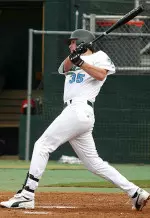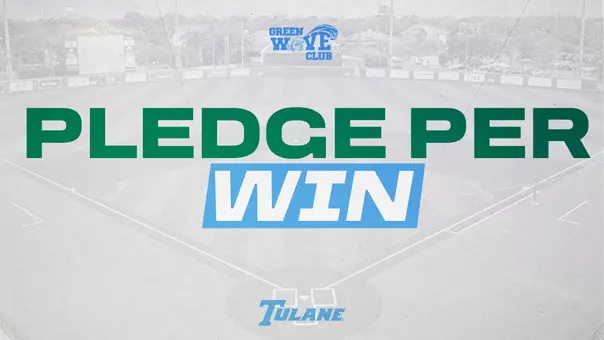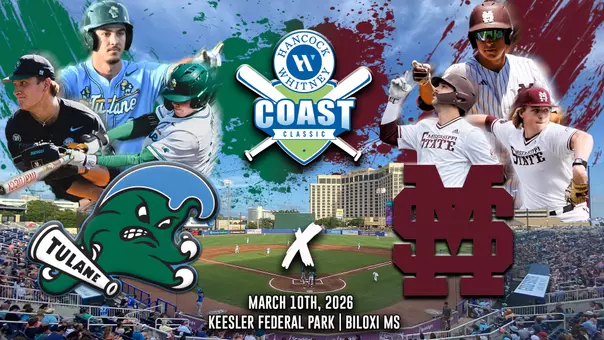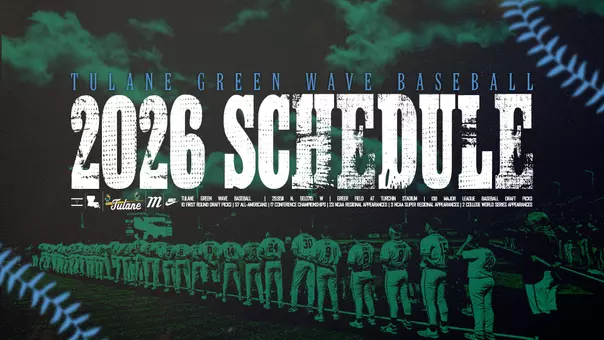
2014 Tulane Athletics Hall of Fame Series: Micah Owings
Nov 12, 2014 | Baseball
This is the fourth of a five part series featuring the 2014 Tulane Athletics Hall of Fame Class. The 2014 induction ceremonies will take place on Thursday, Nov. 13 from 6-9 p.m. at Yulman Stadium.
By Richie Weaver, Tulane Athletic Communications
Keeping tabs on Micah Owings' baseball career is an easy adventure - all one has to do is follow his trail of accomplishments. An All-American at both the high school and college ranks, he helped the 2003 U.S. National Team win the Silver Medal at the Pan Am Games and was named the No. 15 prospect in the Cape Cod League - the premier wooden-bat summer league in the nation - in 2004. In fact, the honors continued to roll in at the professional level as Owings was named a National League Silver Slugger with the Arizona Diamondbacks in 2007.
On Thursday, however, Owings will add another skin to his impressive resume as the native of Gainesville, Ga., will be inducted into the Tulane Athletics Hall of Fame.
"First of all, this is just a tremendous honor," Owings said. "You don't play the game or the sport for this kind of thing but it sure is humbling for me to be a part of the Hall of Fame at Tulane. It's such an elite group."
While Owings' legend on the diamond has long since been the stuff of lore in Green Wave circles, what makes his induction into the Hall of Fame an interesting one is that he earned the honor after playing only one season in uptown New Orleans. That season - the spring of 2005 - was more than memorable, however, as Owings was a big reason the Green Wave were named preseason No. 1, helped lead the team to a school-record 56 wins, the Conference USA regular-season and tournament titles as well as a trip to historic Rosenblatt Stadium for the 2005 College World Series as the No. 1 National Seed.
Owings led the 2005 team offensively with a .359 batting average (78-for-217), 18 home runs, four triples, 65 RBI, 159 total bases and a .733 slugging percentage while pacing the pitching staff with 135 strikeouts and a .228 opponent batting average from the mound. In addition, Owings was third on the team with 19 doubles and 42 walks at the plate and was second on the squad with a 12-4 record and a 3.26 ERA while toeing the rubber.
For his two-way performance on the diamond, he claimed All-America honors from Louisville Slugger/Collegiate Baseball (second team) and Baseball America (third team), earned a spot on the College Baseball Foundation National Honors Team and was tabbed second-team American Baseball Coaches Association All-South Region Team. Owings also claimed first-team All-Conference USA and All-Louisiana recognition and was voted the C-USA Player of the Year.
"I kid him about this, but to play only one semester at Tulane and to go in our Hall of Fame, he had to have the kind of year that was a standout year," former Tulane head baseball coach Rick Jones said of Owings. "He was a great student, and as good of a player as he was and as talented and productive of a player that he was, he was an even better teammate. He was a great teammate and is as loyal to Tulane as anybody who went there for five years. I feel very fortunate that I was able to coach him that year and we remain very close. He's just a special guy in every way."
Owings' arrival at Tulane came at an opportune time to create the perfect storm which created the buzz that constantly surrounded the 2005 Green Wave team. In 2004, with a team composed primarily of sophomores and juniors, Tulane won the NCAA Oxford Regional and advanced to the Super Regionals where it lost to eventual national champion Cal State Fullerton. And while the Green Wave were feeling good about their 2004 accomplishments and looking forward to what could be a promising 2005 campaign, Owings was in a state of limbo.
Coming off his second-consecutive season of being named an All-Atlantic Coast Conference honoree at Georgia Tech, then-sophomore Owings - who was drafted in the second round by the Colorado Rockies out of high school in 2002 - was selected by the Chicago Cubs in the 19th round of the 2004 MLB Draft. While playing summer ball with the Bourne Braves of the Cape Cod League, Owings made a life-altering decision.
"I had made my decision after I had gotten drafted as a draft-eligible sophomore in 2004 that if I did not work things out with the Cubs that year, I was going to transfer," Owings recalled. "That being said, I didn't have any idea where I was headed at the time. I had no interaction with any other school and I can say that with complete honesty. When I did get my release, that's when I went to work to try and determine where I was headed and I pinpointed top-notch programs."
Owings and his father visited four schools in a five-day span, and their last stop was Tulane. From there, Jones, his staff and the Tulane administration got the ball rolling in an attempt to bring in a player that could make an already good team great.
"That was probably the most organized and intense eight or nine hours that we ever had on a recruit as far as how hard we worked on that," Jones said. "We had him see everything that he could see and had him visit with our guys because we knew that with the guys that we had coming back. Now we have a chance to add a Micah Owings - a real two-way phenom - and you have a chance to be what we were: the preseason No. 1 team and the No. 1 seed going into Omaha."
Owings' lone season with the Green Wave got off to a bit of a slow start as he underwent knee surgery during the fall and was a bit rusty as the year began. As the calendar flipped from March to April, Owings was hitting a modest .253 at the plate and had been saddled with three of the team's five losses through 28 games.
After pitching Tulane to an 11-3 win over C-USA foe UAB on April 1, Owings' season took a defining turn in game two of the weekend series in a most humbling way. With the Green Wave holding a 3-1 lead and the bases loaded with one out, Owings - who was 0-for-2 on the day - was lifted in favor of a pinch hitter. Needless to say, Owings' competitiveness bubbled over, but not in a negative way.
"I'll never forget that," Owings said of being taken out of the UAB game. "I'm not criticizing Georgia Tech by any means but I came to the ballpark knowing that I was in the lineup every day. I was never used to being taken out in that situation. That was a situation that I had always thrived in. What it did for me was it woke me up. It gave me a reality check that I still needed to compete personally to earn my spot in the lineup and my position on the team and in the field.
"I won't forget, too, coming in the next day. I really didn't have anything to say to anybody other than go to the cage, get some early work in and it was time to get after it. I think from that point on, my season was a complete flip. It was a tough ride those first couple of weeks there at Tulane and I know that a lot of Tulane faithful were scratching their heads thinking, `What's up with this guy? He's supposed to be helping us out.'"
Tulane went on to win that game, 4-3, and Owings was back in the line-up on Sunday when the Green Wave completed the sweep with a 13-5 victory over the Blazers. He went 4-for-5 with two doubles, a home run and three RBI in that game and was a one-man wrecking crew the rest of the season.
"I think back on that - I pinch hit for Micah Owings," Jones pondered with a chuckle. "He went into the restroom of the dugout. I could hear him in there. He wasn't cursing because he's very religious young man. He was really screaming at himself and he never went back after that.
"I called him in on Monday and said, `I don't want to coach you anymore.' He looked at me and said, `What are you talking about?' I said, `I want to coach that other guy.' He said, `What other guy?' and I said `The Angry Christian.' When he got mad, that was it and I've called him `A.C.' ever since."
Over the final 38 games of the season, Owings hit a jaw-dropping .425 (57-for-134) with a .813 slugging percentage on the strength of 13 doubles, three triples and 11 home runs while driving in 48 runs. From the mound, he went 9-1 from that point on - including wins in each of his final six starts - with a 2.39 ERA while holding opponents to a .219 batting average with 80 strikeouts and just 18 walks in 75.1 innings of work.
While the 2005 season had more than its share of Owings highlights, his gutsiest performance of the year came at one of the most pressure-packed moments of the campaign. After cruising to the C-USA Championship title game - which was cancelled due to a torrential rain storm and hail in Hattiesburg, Miss. - the Green Wave entered the postseason as the No. 1 National Seed and made quick work of the field of the NCAA New Orleans Regional with a 17-7 opening-round win over Southern and back-to-back 10-4 and 7-4 decisions over Alabama.
Hosting a Super Regional on campus for the first time in school history, Tulane got off to a rough start and dropped the first of a best-of-three-game series to Rice, 9-5. With the season on the line, Owings was given the ball and came through with a career-defining moment.
In three seasons and 52 starts as a collegiate pitcher, Owings had never thrown a complete game. He picked an opportune time to earn his first CG, however, as Owings held the Owls to just four base runners on three singles and a walk, faced just three more than the minimum and never let an Owls runner advance as far as second base. Tulane held a 1-0 lead after eight innings, but sent 10 to the plate in the top of the ninth as the Green Wave plated six runs on five hits and took advantage of a pair of free passes to blow the game open. But the day clearly belonged to Owings, who went 2-for-5 with a double and a pair of RBI to extend the series to a winner-takes-all contest.
In that game, Owings came up big once again and got more than a little help from his teammates. After jumping out to an early 2-0 lead in the first, Tulane saw the advantage evaporate as Rice scored single runs in both the second and third innings to tie things up and took a 3-2 lead in the bottom of the sixth.
Tulane was nine outs from elimination and, following a scoreless seventh, the Green Wave looked adversity squarely in the eye. Adversity, however, blinked first as Owings sparked a four-run eighth inning by getting hit by a pitch, but the Owls tied the game in the home half of the frame with three runs of their own to tie the game at 6-all. In the top of the ninth, the first two Green Wave hitters singled, and facing a possible bunt situation, Owings ripped the first pitch he saw from Owls' reliever Adam Hale over the head of shortstop Josh Rodriguez to give Tulane a 7-6 lead they would not relinquish. Two more Tulane runs and a three-up, three-down showing by Rice in the bottom of the ninth, Owings was the first player to greet reliever Daniel Latham on the mound as the celebratory dogpile ensued.
"I tell people all the time that I've been fortunate to play in atmospheres at the highest level, but that atmosphere that day at Tulane was just rocking," Owings said of his game-two Super Regional effort. "It was such a privilege to take the ball knowing our backs were against the wall and having to do something. Being able to take the ball and compete, for me, has always been what it's all about. To do that in that type of setting, the amazing atmosphere and the great fans that we had - what an honor. With how that game turned out, winning game three and going to Omaha was such a special time."
Owings followed up his Superman-like performance with a winning effort on the mound in the College World Series opener as he tallied a pair of hits at the plate and earned the victory on the mound with a four-strikeout performance in a 7.0-inning start against Oregon State.
The 2005 season came to an end, however, two games later as Tulane dropped consecutive games to Texas and Baylor, but the impact Owings made on the program has lasted much longer than the 64 games he appeared in a Green Wave uniform.
"No disrespect to Alex Gordon, who got the [2005] National Player of the Year Award, in my mind Micah Owings should have been the National Player of the Year," Jones said. "For 21 weeks, we were No. 1 in the country. We went into the College World Series as the No. 1 seed. We didn't win it, but Micah Owings - on the No. 1 team in the country going to Omaha - had all of those wins on the mound and of course had the great victory against Oregon State in the opener but he also led us in home runs , RBI, slugging percentage and batting average. How do you get better than that?
"It was a special, special year and I can honestly say that I never coached anybody who had that kind of year when you combined what he did both on the mound and at the plate."
Following the 2005 season, Owings was drafted by the Arizona Diamondbacks in the third round and was soon on the fast track to the Majors. He was originally assigned to the High-A Lancaster JetHawks where he pitched 16 games out of the bullpen, going 1-1 with a 2.45 ERA. In 2006, he played in Double-A with the Tennessee Smokies and in Triple-A with the Tucson Sidewinders. He made 12 starts for the Smokies, going 6-2 with a 2.88 ERA, and was 10-0 with a 3.75 ERA in 15 starts in Tucson.
Owings made the Diamondbacks' opening day roster in 2007 and in addition to sporting an 8-8 record with a 4.30 ERA and 106 strikeouts in 29 appearances and 152.2 innings of work, went on to earn the Silver Slugger after hitting .333 (20-for-60) - the fourth-best batting average for a pitcher since the designated hitter was introduced in 1973 - with seven doubles, a triple and four home runs while driving in 15.
While various injuries had plagued his pro career, Owings played two more seasons in Arizona (2008 and 2011), two years with the Cincinnati Reds (2009-10) and one with the San Diego Padres (2012). In a six-year Major League career, Owings tallied a 32-33 record with a 4.86 ERA and 347 strikeouts in 483.0 innings on the hill while hitting a combined .283 (58-for-205) with a .502 slugging percentage on the strength of 14 doubles, two triples and nine home runs while driving in 35 and scoring 27 runs of his own. Since then, he has spent time with the Washington Nationals, Milwaukee Brewers and Miami Marlins organizations, and most recently played for the Double-A Jacksonville Suns in 2014.
While he is still trying to make a healthy return to the Majors, Owings has long held a spot in the hearts of Green Wave fans and will now be permanently enshrined among the Green Wave all-time greats in the Tulane Athletics Hall of Fame. He is joined in the Class of 2014 by former teammate Brian Bogusevic as well as gridiron great Matt Forté, basketball standout Kim Lewis and track All-American Gloria Asumnu.
"The thing that I would say about Micah is that he was a great, great player for us," Jones said. "Offensively, he led us in so many different categories whether it was batting average, slugging percentage, home runs and RBI and this guy won a ton of games on the mound - and in the last six games of the season that he pitched, he sort of threw us on his back.
"The huge win he had over Rice in the Super Regional when we were down a game and shut them down, and he had the big hit the next day when we were tied in the top of the ninth. Those kinds of things made a major impact, obviously, in us being able to getting to Omaha. It took him a little while to get on track [after offseason surgery], but - boy I'm telling you - once he did it was special to watch."













